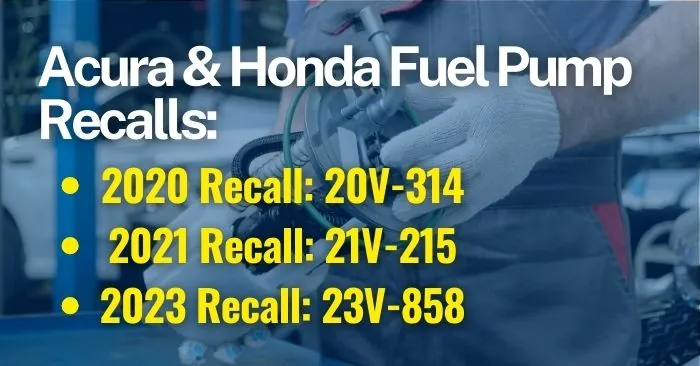Legally reviewed by: Jessica Anvar Stotz, JD, MBA
American Honda Motor Company is recalling over 2.5 million Honda and Acura vehicles due to a defective fuel pump that can fail prematurely. Although modern cars have intricate systems that employ advanced technology, the fuel pump remains a vital component responsible for transferring fuel from the tank to the engine. If the fuel pump fails, the car’s engine may stall or fail to start.
Fuel pump defects can affect various 2017-2023 Honda and Acura models, including the Honda Accord, Civic, CR-V, Fit, HR-V, Insight, Odyssey, Passport, Pilot, and Ridgeline, as well as the Acura ILX, MDX, NSX, RDX, RLX, and TLX.
Important Honda Fuel Pump Recall Information
| Honda Fuel Pump Issue | Improper molding can lead to fuel pump failure, causing the vehicle to stall or not start. |
| Affected Honda Models | Various Honda Model Years from 2017-2020 (Full list below). |
| Affected Acura Models | Various Acura Model Years from 2017- 2020 (Full list below). |
| Recall Solution | Fuel Pump Module Replacement |
| NHTSA Recall Number | 23V-858 |
| Honda Recall Numbers | KGC and KGD |
| Manufacturer Contact Info | 888-234-2138 |
| Previous Recalls | This recall is an extension of the two previous recalls, 21V-215 and 20V-314. |

Honda Fuel Pump Recall Overview
Modern automobiles are complex machines that incorporate advanced technologies, which can sometimes result in various issues for car owners. However, it is often the most fundamental systems that can cause the most significant problems, as is the case with many late-model Honda and Acura vehicles that have faulty fuel pumps.
According to the 2023 recall, several 2017-2020 Acura and Honda models may have been manufactured with defective fuel pumps.
If the fuel pump malfunctions or fails, it can cause a car to stall or not start, posing a risk to both occupants and other vehicles on the road. In 2020, Honda announced a recall of several 2018-2020 Honda and Acura vehicles. The Honda and Acura fuel pump recall was later expanded in 2021 to cover additional vehicles. Now, the recall has been expanded for a third time in 2023.
Which Hondas and Acuras are recalled for fuel pump issues?
The following vehicles are included in the 2023 Honda Fuel Pump Recall:
- Honda Accord (2018-2020)
- Honda Accord Hybrid (2017-2020)
- Honda Civic Coupe (2018-2020)
- Honda Civic Sedan (2018-2020)
- Honda Civic Hatchback (2018-2020)
- Honda Civic Type R (2018-2020)
- Honda Clarity PHEV (2018-2019)
- Honda CR-V (2018-2020)
- Honda HR-V (2018-2020)
- Honda CR-V Hybrid (2020)
- Honda Fit (2018-2019)
- Honda Insight (2019-2020)
- Honda Odyssey (2018-2020)
- Honda Passport (2019-2020)
- Honda Pilot (2017-2020)
- Honda Ridgeline (2018-2020)
The following vehicles are included in the 2023 Acura Fuel Pump Recall:
- Acura ILX (2018-2020)
- Acura MDX (2018-2020)
- Acura MDX Sport Hybrid (2018-2020)
- Acura RDX (2018-2020)
- Acura RLX (2018-2020)
- Acura TLX (2018-2020)
- Acura NSX (2017-2020)
If you are an owner of a Honda or Acura vehicle and experience any of the warning signs of a faulty fuel pump, it is crucial to take your car to an authorized dealer immediately. An authorized dealer will have the expertise and knowledge to examine your vehicle and determine if the fuel pump issue falls under the Honda fuel pump motor safety recall.
Taking your car to an authorized dealer is essential because they will have access to the necessary repair parts and tools, and they will perform the repairs according to the manufacturer’s specifications.
Attempting to fix the fuel pump issue yourself or taking your car to an unqualified mechanic may cause more damage to the vehicle and invalidate any warranties or guarantees. Therefore, it is always best to take your car to an authorized dealer to ensure your safety and the proper functioning of your vehicle.

How do I know if my Honda is affected?
There are a few telltale signs that may indicate a malfunctioning fuel pump in a Honda or Acura vehicle. These signs include a check engine light displaying P0174 or P0171 diagnostic trouble codes (DTC), which signal an improper fuel and air mixture. Additionally, a distinct whining noise from the rear of the vehicle, close to the fuel tank or back seat, may be an indication of a faulty fuel pump.
Other signs to watch out for include difficulty starting the engine, engine hesitation, reduced engine power while accelerating or climbing hills, and engine stalling accompanied by above-normal coolant temperature. Note that although 2017-2020 Honda and Acura vehicles have been recalled, newer Honda and Acura vehicles may also be fitted with defective fuel pumps.
Can you drive with a fuel pump problem?
No, a fuel pump plays a critical role in delivering fuel from the gas tank to the engine. If the fuel pump is not functioning properly, it can lead to a range of problems, including reduced engine performance, stalling, and even engine failure.
Attempting to drive a vehicle with a faulty fuel pump can be dangerous and is generally not recommended. Even if the engine manages to start and run, a partially failing fuel pump can lead to poor performance, reduced power, and stalling while driving, which can be a hazard on the road. Continuing to drive a vehicle with a fuel pump problem can also cause damage to other engine components and lead to costly repairs.
Can I join a lawsuit or initiate an individual lawsuit?
The ability to join a lawsuit depends on several factors, including the type of lawsuit, the parties involved, and the legal proceedings’ stage. If a lawsuit has been filed, and you believe that you have suffered harm due to the conduct of another party, you may be able to join the lawsuit as a plaintiff or a member of a plaintiff class.
In a class-action lawsuit, you may qualify as a member of the class if you meet specific criteria, such as being similarly affected by the conduct at issue.
However, joining a class action lawsuit is a complex process that requires careful consideration. It is recommended that you seek legal advice from a qualified attorney before making a decision.
An experienced attorney can evaluate your specific situation, explain your legal rights and options, and guide you through the process, helping you make informed decisions about whether joining a class action lawsuit is in your best interest or whether filing an individual lawsuit based on your specific circumstances is better suited.
Should I join a lawsuit?
Whether or not you should join a lawsuit depends on various factors, including whether you have been directly affected by the alleged wrongdoing, the potential benefits and drawbacks of joining the lawsuit, and the details of your case. Pursuing an individual case may be a better option than joining a class action lawsuit, depending on the circumstances.
For example, if you have suffered significant damages that are not fully represented in the lawsuit, or if you have unique facts or evidence that could make your case stronger, it may be better to pursue an individual case. Additionally, joining a lawsuit as a member of a plaintiff class may result in a smaller individual recovery than pursuing an individual case.
An experienced attorney can help you determine the best course of action for your situation, whether it involves joining a lawsuit or pursuing an individual case.
They can assess the strengths and weaknesses of your case, estimate potential damages, and advise you on the most effective strategy for obtaining the compensation or resolution you deserve. Ultimately, the decision to join a lawsuit or pursue an individual case should be based on a careful analysis of the relevant factors and a thorough understanding of the legal process involved.
What are my options?
If you own a Honda or Acura vehicle with a faulty fuel pump, you may feel frustrated and unsure of what to do next. Fortunately, you have several options.
If your vehicle is under warranty or part of the Honda fuel pump motor safety recall, taking it to an authorized dealer to have the fuel pump repaired or replaced is the first step. However, if your vehicle is not covered by the warranty or the recall, you may have to bear the cost of the repair yourself, which can be expensive.
Another option is to file a claim under the lemon law. Lemon laws are state-specific laws designed to protect consumers who have purchased or leased a defective vehicle.
If your Honda or Acura vehicle has a recurring problem that affects its safety, value, or usability, and you have given the manufacturer or dealer a reasonable number of attempts to fix the issue, you may be eligible for a refund or replacement vehicle under the lemon law.
Pursuing an individual case under the lemon law may be a better option than joining a class-action lawsuit because it allows you to tailor your case to your specific situation. Working with a lemon law attorney can be especially helpful if you are facing resistance from the manufacturer or dealership.
Lemon law cases can be complex, and manufacturers and dealerships may be hesitant to admit fault or provide compensation. A lemon law attorney can help you navigate these challenges and advocate for your interests, potentially helping you to recover a larger settlement or judgment than you would be able to on your own.
Work with the Honda and Acura Lemon Law Experts!
The Lemon Law Experts have helped thousands of clients with issues related to defective vehicles, including those with Honda and Acura models. Our team of experienced attorneys understands the complexities of lemon law cases and can provide you with personalized guidance and support throughout the entire process.
We will work with you to gather evidence, negotiate with the manufacturer or dealership, and, if necessary, represent you in court. Our goal is to help you get the compensation you deserve and make the process as stress-free as possible. Contact us for a free, no-obligation case analysis today.




